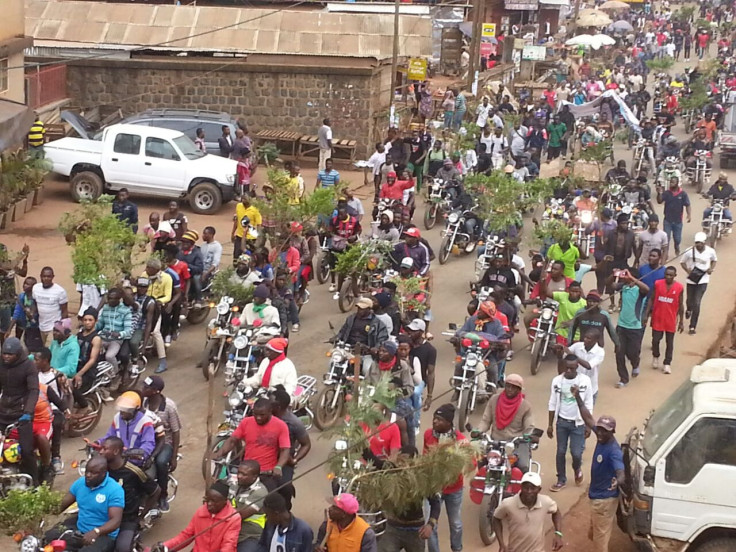UK and US declare Bamenda no-go area as violence rocks Cameroon's English speaking areas
English areas witnessing anti-government protests and strikes over perceived marginalisation.
The UK and the US governments have issued travel warnings for the Cameroonian city of Bamenda, where security has deteriorated due to ongoing protests.
Anti-government protests are underway in Bamenda – capital of Cameroon's Northwest Region – and surrounding areas. Organisers planned the march to coincide with President Paul Biya's speech at the UN general assembly in New York, according to the BBC.
The protest is taking place one day after at least three police officers were injured when a bomb detonated near the Bamenda Regional Hospital. Local media said it was the third explosion to occur in the area in the past two weeks.
"There are reports of protests in these regions and movements within the north west region have been restricted by the Government between midnight on 21 September and midnight on 22 September; you should avoid large public gatherings and demonstrations given the potential for these to turn violent," the UK's Foreign travel advice said on its website.
Similarly, the US embassy in Cameroon urged its officials and citizens to avoid the area until 3 October.
"Even demonstrations intended to be peaceful can turn confrontational and escalate into violence. Avoid areas where demonstrations are taking place and exercise caution when in the vicinity of any large gatherings, protests, or demonstrations" the embassy said.
The Governor of the North West region, Adolf Lele Lafrique, has called on the population to remain vigilant. He reassured people the government will take necessary measures to restore peace in the area, Cameroon Radio Television (CRTV) reported.
Some people have attributed the ongoing violence to increasing tensions in the region over perceived disenfranchisement.
Both Northwest and Southwest Regions, the only English areas of the country, have been rocked by anti-government protests and strikes for months.
French and English are the official languages of Cameroon. Lawyers, teachers and students have been striking since October 2016 against perceived marginalisation, the use of French in courts and schools in the provinces, and the lack of English versions of some legal acts and codes.
Cameroonian authorities have been accused of using excessive force to quell rallies, amid claims some protesters were killed. The government has denied the allegations.
Mothers and grandmothers leading a protest march in Fontem, SW Region.#Bamenda #Buea #Cameroon pic.twitter.com/JcJGnpEIAC
— Albert Nchinda (@AlbertNchinda) September 22, 2017
The government stirred criticism after it implemented an internet ban – which was later lifted – in its English speaking zones, forcing people to travel to French-speaking regions where they can use the internet.
The move prompted the UN and rights groups to call on the governement to restore internet service.
Earlier this month, Biya ordered the release of dozens of activists. The president also instructed a military court to drops charges against those arrested during protests.
However, other activists, including radio broadcaster Mancho Bibixy, remain in jail, Reuters reported. Bibixy is accused of threatening the the integrity of the nation by calling for the breakway of English-speaking regions.
Calls for independence

Amid the ongoing unrest, some groups have taken to the streets demanding a return to a federal state system, the breakaway of the Northwest and Southwest provinces and the restoration of Southern Cameroons, also known as the Republic of Ambazonia.
The government has rejected calls for a referendum on federalism and has blamed secessionist groups for the recent attacks in Bamenda.
Southern Cameroons was the southern part of the British Mandate territory of Cameroons during colonisation.

In 1961, people of Southern Cameroons voted whether to join Nigeria or the Republic of Cameroon, which had already obtained independence from Britain and France one year earlier.
The vote resulted in Southern Cameroons becoming part of the French speaking Republic of Cameroon.
In 1972, a new constitution was adopted in Cameroon, replacing the federal state with a unitary state.
"Gradually they forged us into a unitary state and we have become marginalised, we have been subjected to poverty and all forms of humiliation," Comfort Konfor, SCCUK public relations officer, told IBTimes UK.
"The majority of resources come from English speaking areas of the country, but we don't enjoy it, being an English-speaking Cameroonian is a curse, we have no voice, we are second-class citizens"
Some groups in English Cameroon originally sought a return to a federal system, but eventually started calling for independence.
© Copyright IBTimes 2025. All rights reserved.






















